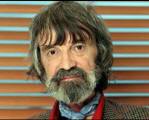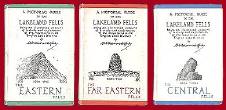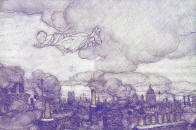|
February 2003
|
|
Contents:
|
|

|
 The death of Peter Tinniswood
on 9th January 2003 at 66 has brought
to an end a distinctive literary
voice.
The death of Peter Tinniswood
on 9th January 2003 at 66 has brought
to an end a distinctive literary
voice.
Tinniswood brought many memorable
characters to radio and television and
has left a legacy of quirky and
entertaining novels ranging from
cricketing stories in Tales from a
Long Room and its sequel, More Tales
from a Long Room to his off-beat
fantasy novel Stirk of Stirk.
One of his best-remembered characters
was Uncle Mort, an indomitable
northerner who contracted cancer in
the screenplay I Didn't Know You
Cared.
Born in Liverpool, Tinniswood grew up
in Sale, Greater Manchester, where he
lived above the dry-cleaners run by
his mother. As a young boy he would
sit under the counter among the dirty
laundry, listening to customers'
conversations.
"It was like live radio," he said "it
sharpened my ear for dialogue...I
became a good mimic." He began his
working life as a journalist, writing
fiction in his spare time until it was
able to provide him with a livelihood.
The Liverpudlian writer was diagnosed
with oral cancer in 1995 and had
undergone surgery to have his larynx
removed. He continued to work
throughout his illness. He said that
writing about what was happening to
him was the only way he could cope.
Among his new plays were Croak, Croak,
Croak and The Last Obit. "I am writing
better than I have in my life," he
said shortly before his death.
|

|
Hugh Trevor-Roper, who died
26th January 2003 aged 89, became a
life peer as Lord Dacre of
Glanton in 1979 and was arguably the
leading historian of his generation.
His career began not as an historian
but as a classicist and he was a
research fellow of Merton College,
Oxford, when he wrote his first book,
Archbishop Laud (1940). In WW2 he
served in the Radio Security Service
and the Secret Intelligence Service
and after the war travelled through
Germany, tracking down and
interrogating survivors of Hitler's
court and reconstructing not only the
circumstances of the Fuhrer's death
but the power structure of his regime.
The classic that made his name was The
Last Days Of Hitler (1947) but
Trevor-Roper's interests could not be
confined to a single period or
country. In 1957, at the age of 43, he
was appointed to the Regius
professorship of modern history at
Oxford, a position he held, in
conjunction with a fellowship at
Oriel, until 1980 when he moved to
Cambridge as Master of Peterhouse.
His reviews and essays in the press,
ranging widely in subject matter
reached an audience well beyond the
academic community. He also wrote
Hitler's Table Talk (1953) and edited
the books, Hitler's War Directives,
1939-45 (1964) and The Goebbels
Diaries (1978). His work had a popular
touch and he paved the way for the
modern television historian, appearing
on programmes regularly and also
working as a journalist.
In 1985 he made the gravest of
those errors of over-confidence to
which he was occasionally prone when
he examined the fake 60 volumes of the
'Hitler Diaries', supposedly the
personal thoughts of the dead
dictator, which were in fact the work
of a German fraudster. Amid all his
public controversies, he remained an
essentially private, even a shy man.
In retirement he lived at Didcot, a
town convenient for both Oxford and
London.
|

|
D. J. Enright, poet, critic and anthologist has died of cancer aged 82.
The unsung hero of postwar British poetry,
he was an outside bet - and reluctant candidate - as poet laureate in 1984.
He worked much of his life
outside the UK,
in Alexandria and
in several South
Asian universties,
before returning
to UK as co-editor
of Encounter and
was subsequently
on the board of
Chatto and Windus.
A pupil of F. R.
Leavis at Cambridge,
whilst abroad he
mixed with locals
and was stubbornly
independent, an object
of mistrust to both
British Embassies
and foreign governments.
His most notable
endeavours included
The Oxford Book Of Death (1983) and The Faber Book Of Fevers And Frets (1989).
|
|
|
 The vintage children's book series 'Mr
Men' are to be rejuventated - 15 years
after the death of their creator Roger
Hargreaves.
The vintage children's book series 'Mr
Men' are to be rejuventated - 15 years
after the death of their creator Roger
Hargreaves.
The books will be posthumously credited to
Roger Hargreaves - although his son,
Adam, has written and illustrated a set of new
books featuring six new characters - Mr Cool,
Mr Rude, Mr Good, Little Miss Bad, Little Miss
Scary and Little Miss Whoops.
Adam took over the running of the
multi-million pound Mr Men empire after his
father died of a stroke at the age of 53. He
provided the original inspiration for the
books when he asked his father what a tickle
looked like. From there, the little round
figure, with impossibly long arms and an urge
to tickle anyone within reach, was born.
More than 100 million Mr Men books have been
sold since 1971, making Roger Hargreaves the
second best-selling UK author after Harry
Potter creator JK Rowling. When they were
originally published, Mr Tickle cost 15p in
1971. Early first editions are still
relatively inexpensive - and could make a fun
collection.
|
 Marvel Comics plans to break new
ground in the comic book industry by
introducing the first openly gay title
character in a comic book. The character will appear in a revival of the
1950s title, "The Rawhide Kid". Marvel
expects a February debut.
Marvel Comics plans to break new
ground in the comic book industry by
introducing the first openly gay title
character in a comic book. The character will appear in a revival of the
1950s title, "The Rawhide Kid". Marvel
expects a February debut.
The Rawhide Kid has been a Marvel character
since the 1950s both as a main and a secondary
character. Although shy with girls, the
original Rawhide Kid was not intended to be
gay. The new version uses double entendres and
euphemisms to reveal his homosexuality without
saying anything explicitly.
In a bubble in the first edition of the
series, Rawhide Kid comments about the Lone
Ranger: "I think that mask and the powder blue
outfit are fantastic. I can certainly see why
the Indian follows him around."
Marvel is planning six stories over the next
six months. After looking at the response to
those issues they will decide whether to
continue production and whether they would be
interested in more series with gay title
characters.
|
|
|
The
Whitbread Book of the
Year
The
overall
winner of the 'Whitbread
Book of the Year' prize of £25,000, awarded in January
2003 for the best book of 2002,
is Claire Tomalin for her
biography of Samuel Pepys 'Pepys:
The Unequalled Self'.
Private Eye editor Ian Hislop led the judging panel which included authors Joanna Trollope, poet Wendy Cope and Sunday Times fiction editor Peter Kemp. The
award was announced
at the the Whitbread Brewery in
central London on 28th January and
was chosen from the
winners of the five categories:
Novel, First novel,
Poetry, Biography and
Children's book.
|
| It was the way that Tomalin had "filled in the gaps" in Pepys' eventful and bawdy life that had really impressed the judges. His notoriously frank diaries, first published 150 years after his death, covered only nine years of his life.
The 27
years that precede the diary - of Pepys' family, childhood, education, professional advancement and marriage
and the 34 years that follow it, when the death of his wife and public disgrace were followed by rehabilitation, distinguished years of naval administration, an active retirement after 1688 and a second long relationship, all had to be tracked without the diary.
Claire
Tomalin has done a mighty labour of research amongst
thousands of letters, Pepys' work-papers and trial documents, naval histories,
Admiralty papers, contemporary diaries and memoirs and many histories and biographies
and has brought to life London as
it was before, during and after the great fire - its river life, the chaos of its streets in the civil war, Whitehall and Westminster where the young Pepys worked
- all these leap from the page.
The five main category
winners from which the winner was
chosen were:
- Novel:
Michael Frayn, Spies
- First novel:
Norman Lebrecht, The Song of Names
- Poetry:
Paul Farley (above), The Ice Age
- Biography:
Claire Tomalin, Pepys: The Unequalled Self
- Children's Book:
Hilary McKay, Saffy's Angel
|
|
|
 Publishers Michael Joseph are to cease
publication of the much-loved and much
collected Wainwright Guides to the Lake
District.
Publishers Michael Joseph are to cease
publication of the much-loved and much
collected Wainwright Guides to the Lake
District.
These unique guides, written in Wainwright's
own meticulous hand-writing and illustrated
with cross-hatched drawings and ink-diagrams
are in a class of their own. Wainwright's
guides are not just route-maps for interesting
fell wanderings but often take in the history
and pre-history of the area - like taking a
particularly entertaining and knowledgeable
uncle along on the walk.
Alfred Wainwright was the son of a
Blackburn stonemason. Born in 1907 he first
visited the Lake District in 1930. The current
publisher Michael Joseph, part of the Penguin
group, says that it can no longer print the
books because of declining sales.
First and early editions of the guides,
originally published by the Westmorland
Gazette, continue to hold their prices - often
hundreds of pounds - showing that discerning
collectors appreciate the value of their
clarity, simplicity and elegance.
|
|
 The
copyright in Peter Pan is in dispute
over the proposed US and possibly
UK publication by a Canadain author. The
copyright in Peter Pan is in dispute
over the proposed US and possibly
UK publication by a Canadain author.
Great Ormond Street Hospital for Sick Children in London
was granted the rights to the work in
perpetuity by the playwright J.
M. Barrie 74 years ago.
Ms Emily Somma has written a children’s novel, After The Rain: A New Adventure For Peter Pan, which has been published in Canada.
If she is successful in winning US publishing rights, the case could lead to a proliferation of new images and stories featuring Peter, Wendy, Tinkerbell, Hook and the rest of them.
However the London Hospital is determined to protect its rights which provide an invaluable source of income.
The book was published in August 2002
by Daisy Books, a small press in Hamilton, Ontario. Immune from the British Act of Parliament that extended royalty rights to the hospital in perpetuity, Peter Pan falls within the public domain in Canada.
The book has no distributor in the UK and might have remained unnoticed had not Somma sought publishing rights in Britain. Advised to clear her title with the hospital, she was immediately declined permission to publish.
The case has wider implications and may set a precedent in copyright law. The author is being advised by Professor Lawrence Lessig and scholars from Stanford University. This high-powered legal team argues that internet and copyright laws can stifle creative work and in the recent past Professor Lessig has taken on media giants such as Microsoft and Disney in an attempt to establish the point.
|
|
 The adventures of twins Topsy and Tim have captivated children for generations.
Now the books, written by Cambridgeshire author Jean Adamson and her late husband Gareth, are being relaunched in new editions. The adventures of twins Topsy and Tim have captivated children for generations.
Now the books, written by Cambridgeshire author Jean Adamson and her late husband Gareth, are being relaunched in new editions.
At the time of first publication in 1960 most of the books aimed at children included magical characters such as Noddy, Andy Pandy or Thomas the Tank Engine.
Jean felt that children created there own magic and decided to do something for the modern world with real-life children.
Since 1960 more than 130 Topsy and Tim titles have been published with sales of more than 21 million copies
and the series has never been out of print in one form or another.
|
|
Next Month:
In March 2003 the featured article will be by Green
Meadow Books
|
|
|
|

